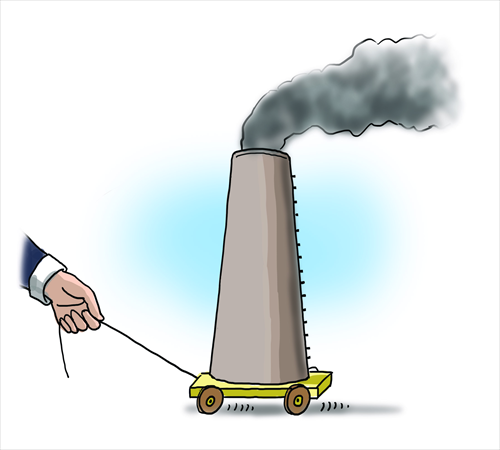Local protests suffer from tunnel vision

Illustration: Liu Rui/GT
A series of violent protests have raised concerns about the power of local interests in modern China. The latest incident, directed against a waste incineration power plant in Hangzhou, Zhejiang Province, saw some local people illegally block the road and fight with the police.
On Thursday, some residents in Xi'an, Shaanxi Province, tore down the fence of a construction site of a subway substation around their neighborhood for fear of radiation, which in reality, according to experts, is no bigger than that of a household electric fan.
Although treated as an outlier by most Western countries, China's political system boasts one great advantage that has been widely recognized: It enables the entire nation to pool resources on short notice to resolve major problems and accomplish large undertakings. China's rapid development, especially in economic infrastructure, has been benefiting from this system for decades.
But recent years have seen the effectiveness of the system declining, since more dissenting voices turn up their volume and raise heavier concerns about large infrastructure projects around their neighborhood.
Mass incidents triggered by protests against heavy industrial projects have made headlines since Xiamen, a city in East China's Fujian Province, drew nationwide attention in 2007 because local residents waged a massive campaign to stop a paraxylene (PX) project from kicking off. After rounds of negotiations, this project was terminated by local authorities and relocated to Zhangzhou, a neighboring city.
Since then, PX has become notorious among the Chinese public. Local people in cities like Ningbo, Dalian and Maoming, who seemed to be enlightened by "victory" in Xiamen, all rose up and challenged their local PX factories. Concerns for environmental pollution and public health have expanded the boycott against PX projects to many other infrastructure projects, such as power plant, waste incineration plant, and even subway.
These recent protests are not launched out of universal environmental or public health concerns. Basically, they just hope these projects, which cannot be 100 percent safe, won't be built around their neighborhood.
This not-in-my-backyard syndrome, or nimby, is new to Chinese society.
Its influence can twist the arms of decision-makers, force project developers to compromise, and even press legislators to change the laws. They demand to block any construction that might be risky and threatening.
To some extent, nimby could be regarded as a manifestation of people's growing awareness to make use of their civil rights. But it doesn't mean nimby can always serve the public good. Limited advocacies like these are not about the public interest much of the time, but about individual concerns.
Nimby has already become a headache for many Chinese local authorities. As of now, the most adopted solution by local governments is to do more public relations (PR) work to reduce the fear and concerns of the public.
PR and education help, but not after these projects are approved or even kicked off without the neighborhoods being fully informed. Lack of planning and organization always restrict local governments to take the initiative. Crisis PR won't make up the work that should have been done several years ago before these projects were started.
Many local residents believe the benefits they can acquire from a neighboring infrastructure project do not match the costs they will take. There is no absolute guarantee that nuclear power plant, waste incineration plant and chemical factories can be 100 percent safe. There is still a chance that their life and property are threatened.
When the threat becomes real, the neighborhood will bear the brunt of the costs and risks.
However, these projects, which are basically established for long-term and broad public goods, do not bring many visible and direct benefits to the neighborhood. In this case, project developers and local governments have to consider how to enlarge their contributions to local communities, such as offering yearly environmental subsidies and recruiting local residents as employees.
The Internet is speeding up the expansion of nimby protests, and a simple suppression of this phenomenon will probably breed more confrontations. But the initiative to deal with these conflicts cannot be taken by the disoriented public. It has to be gained by local authorities, which need to learn how to act more proactively and wisely.
The author is a reporter with the Global Times. liuzhun@globaltimes.com.cn